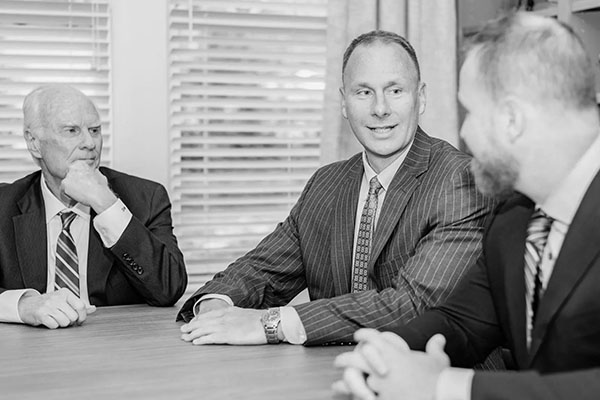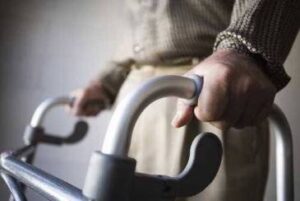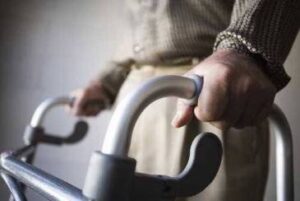Greenville Nursing Home Abuse Lawyers
With offices in Greenville County, South Carolina
Do you need legal help?
Client
Reviews
See what our past clients have to say about us.

Only Serving People, Never Companies
About Our Firm
Founded in 1975, Christian & Christian has deep roots in the community. Our lawyers have worked hard to build a strong, caring legacy of legal advocacy and protection for injured people. We stand up to injustice and help injury victims in their fight against well-funded insurance companies.
Learn more about our attorneys
9 Mistakes That Could Ruin Your Personal Injury Claim
Enter your information below to download our free legal book.
Choosing a nursing home for your elderly loved one can be an emotionally taxing process. Even when you’ve done all you can and are faced with finding a facility, there is often a tremendous amount of guilt involved in the decision to move forward. But if the facility you’ve chosen has betrayed your trust and abused or neglected your loved one, you deserve to pursue compensation.
Facing the possibility of nursing home abuse is stressful. You may be uncertain of the best way to verify your suspicions before speaking up. You’re probably looking for someone you can turn to for answers.
We are here to help with free legal advice. Call our Greenville nursing home abuse lawyers as soon as you can.
Don’t let worry over needing money up front keep you from getting answers. Just give us a call and schedule your free legal consultation.
According to the CDC, more than 500,000 elderly adults 60+ years of age are abused or neglected every year, and that includes those in facilities around Florence, Williamsburg, Darlington, and all of South Carolina.
It’s important to protect your loved ones, which is why people place their trust in facilities to care for elderly adults as they get older. If you think your loved one is being neglected at a nursing home around Greenville, SC for any reason, please reach out for a free legal consultation to find out how you can pursue maximum compensation.
The law firm of Christian & Christian Law is located in Greenville and proudly serves families all over South Carolina, including those outside of the upstate area in Aiken, Florence, Marlboro, Williams, and Darlington, SC. Nursing home abuse and neglect is among the practice areas for which we help our clients seek justice.
Nursing Home Abuse Claims We Handle
We handle all types of nursing home abuse and neglect claims, including claims against nursing home neglect during the COVID-19 pandemic in South Carolina. Below is a comprehensive list of claims we handle. If you don’t see a case below, it’s likely we can still help. Reach out to Harold, Josh, or Matthew Christian to get your claim questions answered in a free legal consultation.
- Bed Sores: Known as pressure ulcers, are a result of decreased mobility and lack of movement.
- Malnutrition & Dehydration: Results from an imbalanced diet or a diet lacking proper nutrients, liquids, or water.
- Over-Medication: When an elderly patient is intentionally given too much medication. This is a direct form of abuse.
- Assisted Living Abuse: Occurs when your loved one suffers general neglect, sexual abuse or physical abuse in an assisted living facility or nursing home.
- Nursing Home Abuse: Occurs when your loved one suffers general neglect, sexual abuse, or physical abuse in a nursing home.
If you are concerned that someone you know is suffering nursing home neglect or abuse, reach out to our team to find out how we can help you pursue justice.
Alzheimer’s Abuse with Elderly Care
Experts suggest that as many as 5.5 million Americans over the age of 65 suffer from Alzheimer’s Disease. Many of these Americans are also nursing home residents. The degenerative brain disease is both progressive and irreversible, and those who suffer will experience memory loss, impaired thinking skills, and, ultimately, the inability to carry out simple tasks.
Among Alzheimer’s patients suffering from dementia, anywhere from 34% to 62% may be the victims of abuse and/or neglect from a caregiver.
What makes nursing home residents with Alzheimer’s easy targets?
- The disease may prevent them from remembering that abuse occurred in the first place.
- Their history of mis-remembering facts could cause disbelief among the people to whom they try to report the abuse.
- Alzheimer’s often affects mood/personality, causing patients to be irritable, paranoid, confused, and/or aggressive, which makes it easier for aggressors to shift blame or cause doubt about the accusations that have been made against them.
- Those in advanced stages of Alzheimer’s may have lost their ability to speak.
- Abuse and neglect of Alzheimer’s patients can take many forms, the most common of which are physical/sexual, emotional, and financial. If you notice any of the following signs or changes in behavior among your elderly loved one(s), it may be time to take legal action, and, certainly to consider relocating them to another facility.
Signs of physical/sexual abuse: unkempt appearance (unwashed or unbrushed hair, dirty clothes, etc.), unexplained injuries (bumps, bruises, scratches, broken bones), sudden weight loss, bedsores
Signs of emotional abuse: withdrawal from socializing or other normal activities, intense fear or avoidance of caregiver, depression/anxiety, abnormal violent behavior, odd “coping” mechanisms, i.e., sucking fingers, rocking back and forth, talking to themselves, irregular eating and/or sleeping patterns
Signs of financial abuse: unexplained missing money, mysterious disappearance of valuables such as jewelry, family heirlooms, etc., suspicious credit card activity, unusual ATM or bank withdrawals, unpaid bills (if out of character for your loved one)
Alzheimer’s is a frightening disease, both for the person suffering, as well as the family members who must watch their loved one’s mind and spirit deteriorate. This should never be made worse by the care facility to which you entrusted your loved one’s wellbeing.
If you have identified signs of abuse or neglect in your loved one, please do not hesitate to contact our team. We can help you take legal action against those responsible to ensure this egregious abuse of power does not continue to harm your loved one or any other residents of the nursing home facility.
Is It Worth It to Hire an Attorney?
Many people wonder whether hiring a lawyer will make any difference in their claim. They delay hiring an attorney or skip it entirely, thinking they’ll save money by taking on their claim alone. But these people almost always end up with far less in compensation than they would if they had hired an attorney.
Hiring an attorney protects you from the many ways your claim is vulnerable to losing its value:
- Hiring a lawyer tells the insurance company they can’t take advantage of you to save money. It tells them if they refuse to offer you a fair settlement in good faith, and instead delay or deny your claim without a legitimate reason, your lawyer will file a lawsuit on your behalf.
- Our Greenville nursing home abuse lawyers can avoid the tactics insurance companies use to lower claim values. This is how insurance companies save money, and they are very good at it. But your lawyer will see them coming from a mile away. One of the best ways your lawyer can help fend off insurance company tactics is to handle all claim communications on your behalf. This prevents costly miscommunications and relieves you of having to deal with the insurance company yourself.
- Our Greenville nursing home abuse lawyers know how to investigate nursing home abuse and neglect, gathering evidence and testimony to support your claim.
- When you hire an attorney, you’ll have someone to help you review settlement offers. The right attorney is going to turn over the ultimate decision on whether to accept an offer to you. But they will also guide you every step of the way, providing input and answering your questions, so you don’t jump at a lowball offer that’s not in your best interests.
- Hiring a trial lawyer means they can take your claim to court, if necessary, with the skills to win. Hiring a trial attorney also may give the insurance company incentive to avoid trial with a settlement.
- With our Greenville nursing home abuse lawyers by your side, you can hand over all the communications and stress of your claim and focus on rest recovery.
Christian & Christian Law assist people with personal injury matters in the following locations: Anderson, Clemson, Easley, Fountain Inn, Greenville County, Greer, Mauldin, Simpsonville, Spartanburg, and Travelers Rest.

Related Videos
How to Avoid Damaging Your Nursing Home Claim
Facing the possibility that your loved one may be the victim of nursing home abuse is tough. What if you’re wrong and you upset the staff? Even worse, what if you’re right? Will anyone at the facility retaliate against your loved one?
The first step in moving forward is getting more information. As you do, make sure you protect the value of a potential claim by avoiding common claim mistakes.
Don’t Put Your Trust in the Facility without Verifying Everything Is Okay
It can be difficult to tell whether a loved one is suffering while in a home care facility. A few telltale signs are seeing your loved one’s financial status take a quick downturn, the appearance of bruises or sores, and changes in emotional health.
It’s important to remember that nursing home abuse is not always physical. It can also take the form of emotional abuse, financial exploitation, sexual abuse, or general neglect for care.
You may be hesitant to look too deeply for problems if you think you or your loved one may be mistaken. This is a particularly worrisome possibility if your loved one has been having memory issues.
Even if memory loss is a factor, the fact that your loved one is unlikely to be able to defend themselves on their own makes it important to treat all claims or suspicions with objectivity until you are sure they are unfounded.
If you think something is “off” and your loved one hasn’t mentioned abuse or neglect to you, it’s still worth looking into, because they may be too embarrassed or unable to tell someone what’s going on.
Start by visiting the home frequently enough to catch patterns. The more time you spend there, the more familiar you’ll be with your loved one’s routine, and the easier you’ll spot an anomaly. Show up as regularly as you can and pay attention to what you see and hear.
If your loved one is telling you outright there is a problem, you can seek supporting information before speaking to the staff if you are doubtful, but the stakes are too high to just assume they’re mistaken. Ask yourself if they appear to believe what they are telling you and trust your gut; you know this person.
Try asking yourself some questions:
- Does my loved one seem less energetic than normal?
- Are they behaving differently?
- Have they come out and said someone has mistreated them?
- Do they appear depressed or anxious?
- Are they behaving fearfully around another resident or staff member?
- Have I seen physical signs of abuse, such as bruises, bedsores, or scratches?
- Are they less mobile than usual?
- Are they withdrawing from activities they’d normally participate in?
- Is their hygiene being maintained, or are there signs they are being neglected?
The more you see your loved one, the clearer these answers will become. Keep an eye out for how they behave around other residents and staff. Do they perk up, or are there signs of fear, such as flinching or cowering?
How does the staff behave? Do they appear stressed or impatient? What about other residents? Do any of them appear to be angry, aggressive, or bullying?
Keep Records
It’s always helpful to make a habit of keeping a journal or regular notes when you’ve got a loved one at a nursing home. Include the date, time, and a brief note for every visit. If you do this regularly, even if things seem fine, your notes will have added creditability. This is because if something goes wrong, your journal will reflect that you’ve been paying attention since back before any issues arose.
Consider making it a practice of asking the nurses if your loved one is eating regularly and participating in activities they normally enjoy. This information can be added to your notes, even if it’s just a quick sentence.
Taking regular photographs of your loved one is also an excellent way to show changes in weight and to record any bruises visible on the face, arms, or legs.
File a Complaint at the Nursing Home
Though the thought of speaking up can feel overwhelming, nursing home facilities have citizen representatives in place to provide a means for addressing complaints without fear of retaliation. The representative is called an ombudsman, and they may be a volunteer or a staff member.
The job of the ombudsman is to resolve patient care issues quickly before they escalate, and without any retaliation against the resident. When you speak to the ombudsman, record the result of the conversation in your notes, so you know what they promised to do to resolve the issue. You can then follow up to see if it was actually done. These notes can provide you with valuable support if you should later file a claim, showing you followed procedure in trying to resolve the issue.
Don’t Talk to the Insurance Company
If after you’ve worked with the ombudsman you decide to file a nursing home claim, you’ll be contacted by the facility’s insurance company to provide a recorded statement. Don’t agree to this without the guidance of your lawyer.
The insurance company is looking for any way to save money by dropping the value of your claim. They do this through creative interviewing — trying to trip you up and get you to say something they can turn against you.
Do not drop your guard if the insurance company calls; they are not a sympathetic friend. They are trying to take advantage of you.
Your best move here is to turn over all communications about your claim to our Greenville nursing home abuse lawyers. This will protect your claim’s value by preventing even the smallest possibility of a miscommunication. Our Greenville nursing home abuse lawyers know how to handle the insurance company. Do yourself a favor and let them.
Hire a Lawyer as Soon as Possible
Confusion and being overwhelmed about how to proceed when you suspect abuse in a nursing home can cause finding a lawyer to get shoved to the back of your mind. Hiring a lawyer, however, is the first thing you should do if the situation has not improved after speaking with the ombudsman.
Learn more about how our Greenville nursing home abuse lawyers can help you in a free legal consultation. We’ll be happy to answer your claim questions and give you guidance on your next steps.
The sooner your attorney gets involved, the more time they will have to build and strengthen your claim. Evidence needs to be gathered and witnesses interviewed. Don’t give evidence time to “disappear,” accidentally or otherwise.
It’s also important to consider that the sooner you take a stand, the sooner whatever is happening to your loved one will be put to a stop. This is likely to protect other residents from the same mistreatment.
Hire the Right Lawyer for Your Nursing Home Abuse Claim
It’s important to choose a lawyer who has experience with nursing home abuse claims. This will be someone who spends a great deal of time focused in the realm of personal injury, who has a record of success resolving nursing home abuse claims.
It’s also vital that this person be a trial lawyer. While your claim may be resolved at the settlement stage, it may not, in which case your only avenue for resolution is a lawsuit. If you need to go to trial to protect your loved one’s rights, make sure you’ve got an attorney who can win in court.

Related Blogs
Greenville Nursing Home Abuse Client Story
We are sharing the story below to help illustrate what to expect in a nursing home abuse claim. Please read it through for more helpful information. We’ve changed details and names to protect our client’s privacy, but the value of the information remains.
On a cool Saturday in April not long ago, Linda Fairmont pushed through the doors of the nursing home where her mom had been living for the past six months. She shifted the large package in her arms to keep her tote bag from sliding off her shoulder as she passed the front desk. Smiling at the receptionist, she turned down the south wing and headed for her mom Mary’s room.
Linda had made it just in time to take her mom down to the cafeteria for breakfast. It was their established Saturday morning ritual. Mary’s clear blue eyes brightened when Linda came in, though they looked more tired than usual. Linda unloaded her items onto the bedspread and greeted her mom with a hug.
They spent the next hour in the cafeteria, eating and sipping tea with the other residents. During the meal, Linda noticed her mom shifting restlessly in her wheelchair.
“Mom, are you comfortable?” Linda asked, seeing her mother wince as she once more shifted her weight slightly.
“Oh, well, you know,” Mary said in her New England lilt. “I go with the flow.”
Mary never complained, but Linda could tell she was uncomfortable. As she navigated Mary’s wheelchair back to her room after breakfast, she told her about the items she’d brought.
“I noticed you’ve had some redness after sitting for a while, and I discovered this wonderful new cushion. It’s made of gel foam. I got one for your chair, and I found a mattress pad, so you can sleep on one, too. Your whole body will feel like you’re sleeping on a cloud,” said Linda as she pushed through the door to the room.
“Sounds expensive,” Mary said uncertainly. Linda smiled and assured her mom she’d practically stolen them on sale. It was a white lie, but she would not let her mother’s austerity mentality cause her discomfort.
Linda took Mary to the bathroom, setting the foam cushion in place in the wheelchair for when her mom sat back down. Helping her mom through the process, she noticed her delicate skin was still red. When Mary settled back in her chair, her eyes closed, and she sighed. “This is a nice cushion,” she agreed.
“Isn’t it?” Linda said as she pulled the sheets from the bed to set the mattress cover in place. “I have one at work and one at my desk at home.”
Linda was about to pull off the fitted sheet when she noticed the oddly shaped stain near the head of the bed. She’d asked a certified nurse’s assistant (CNA) about it and had been told it was “just a stain” and the sheets were in fact clean. Linda requested they be changed anyway, and the CNA had agreed. But that had been two weeks ago. And this wasn’t the first time it had happened.
Not only didn’t they follow through, but they were way behind their own schedule. Now Linda excused herself for a moment and stepped into the hall to flag down a CNA. Spotting one emerging from a nearby room, she politely but concisely requested a new set of sheets, and no, it couldn’t wait.
After her mom’s bed was made, she spent another hour with her out in the recreation room before leaving to run errands before her return at dinner. On her way out, Linda spoke to the front desk about the fact that her mother’s sheets had not been changed in two weeks and that the red skin she’d reported two weeks back on her mom’s behind wasn’t improving.
To her utter shock, the woman appeared annoyed. She argued about the sheets, claiming Linda must be confused. She also assured her that Mary was receiving “the very best care” and that her comfort was their top priority, but that seniors who are no longer mobile experience “a little redness at times” from so many hours sitting. She added, “especially if they are incontinent.”
“Excuse me?” Linda said, frustration rising in her throat. “My mother is not incontinent, thank God. But should she or any other resident face that challenge, I expect you will be tending to them to make sure they are dry and comfortable.
“In the meantime, I expect my mother to be taken to the rest room in a timely fashion when she expresses the need, so she can use the facilities. She is 84 years old, and I expect her dignity to be honored at all times.
“In addition, the sheets are in fact old,” she said, holding up a photo on her phone. “I recognize this stain that caused me to request they be changed two weeks ago. It’s shaped like the state of Texas.”
Linda’s frozen smile was painful to keep in place while she spoke to this woman as calmly but firmly as she could. In response, the woman grudgingly said she’d relay the information, making a note as she pinched her face in a sour lemon expression.
When she got home that day, Linda tried to reach the ombudsman without success. By Tuesday she’d left two messages. On Wednesday, Linda came home to a voicemail from the ombudsman, sounding harried. She apologized and said she’d make sure her mother was “squared away.” The term did not sound very compassionate, and what did that even mean, anyway? Mary wasn’t a piece of luggage.
Linda began showing up randomly twice a day and keeping detailed notes. She also made an appointment to have her mom’s doctor look at her rash the following Monday.
On Thursday evening, Linda arrived at the nursing home to discover her mom’s wheelchair cushion was missing. A quick scan of the room revealed the cushion lying under the bed, in the dust. She spoke to the young woman at the front desk on their way to the dining hall and got nowhere.
“It probably just fell off when she was transferred to the bed,” she said, brightly, not bolstering Linda’s confidence in the facility at all.
On Friday, Linda called the ombudsman to check in, only to get a message that she was out of the office for two weeks.
The next day was again Saturday, a week since she’d put the mattress pad on the bed. She arrived to discover it was missing. She asked about it at the front desk on the way to breakfast, but the woman at the counter had no idea about the mattress pad.
“Did you put your mom’s name on it?” she asked with a frown.
“Yes, though I don’t know why it would need her name on it. I can’t think of a reason it would leave the room,” said Linda, frustrated.
Back when she’d moved her mom into the facility, she had brought her mom’s own sheets with her, also labeled with her name, only to have those “evaporate” barely a month later. But how does a mattress pad go missing?
“Well, if the mattress cover turns up, we’ll have to have you put her name on it,” said the woman turning her back to answer the phone.
“It’s not a cover, it’s a two-inch thick—” Linda stopped talking. The woman was ignoring her as she spoke on the phone to someone else. Shaking her head, Linda pushed her mom away from the desk and into the dining hall.
As they ate breakfast, Mary was noticeably pale, and her eyes had lost their sparkle. Though normally reserved, she was even quieter than usual, even withdrawn. She looked like she was shrinking into herself. Had she lost weight?
Linda began to worry about her mom’s serious fish allergy. She found herself wondering if they would pay attention to it if they were ignoring other things, including a worsening rash. If they fed her fish, she’d go anaphylactic.
As they left the dining hall, she asked one of the dietary aides clearing the table about it. She said she was not personally aware of anyone’s allergies, but that Linda should stop by the front desk and let them know.
Let them know? Seriously? Mary had been there for six months. And telling the front desk about something so important hardly gave her assurance. Linda thanked the “dietary aide” and took Mary back to her room to use the bathroom. That’s when she discovered Mary’s skin rash had gone from red to raw and bleeding.
Linda was done. She made her mom as comfortable as possible and left the building.
She brought Mary to a walk-in clinic immediately, then she brought her back to her home and called the law firm of Christian & Christian Law to schedule a free legal consultation.
Linda and Mary arrived at the law firm the following Tuesday and sat down with Attorney Matthew Christian to discuss a potential nursing home abuse claim.
How much does it cost to hire a lawyer?
“Before we get started, can you please tell me how much it would cost to hire the firm?” Linda asked, her eyes sliding sideways to her mom for a fraction of a second. “As you may imagine, these past six months have been a financial juggle.”
“Understandable,” said Attorney Christian said, nodding. “The firm works on a contingency basis, which means we cover all expenses related to your case while your claim is open. In the end, we only charge you if we successfully resolve your claim.”
“Okay, that sounds doable,” said Linda.
“And this consultation is free, Ms. Fairmont, so please, feel free to ask your questions.”
How can I tell if I’ve got a claim on behalf of my loved one?
“I’d like to start by asking if you think Mary has a claim. I mean, no one appears to be physically abusing my mother in an obvious way, like bruises and broken bones. But I’ve been keeping notes for weeks, and the facility hasn’t been responsive to my requests, I can’t seem to get them to stick to even a weekly schedule of washing the bed sheets, my mom’s things are disappearing or getting kicked under a dusty bed, and most importantly, they don’t seem to be doing anything about the serious chafing —” Linda paused, afraid of embarrassing her mom.
“I’ve got bedsores on my bum,” Mary said, holding her chin high. “I don’t consider that acceptable. Do you?” she asked Attorney Christian. Her daughter’s eyes welled with tears.
“The walk-in clinic said it’s stage 2, heading for stage three,” Linda said, tears spilling down her cheeks. “How can this happen? I’m there every day, I…” Mary took her daughter’s hand and squeezed as Attorney Christian passed her the tissues.
“And Heaven forbid they don’t pay attention to Mom’s fish allergy. That could kill her. I do not want to catastrophize here, but I can’t even get a response from the ombudsman, let alone the respectful attention from the staff,” Mary added tearfully. “It’s almost comical how attentive they were by comparison when we toured the facility and they wanted to sign us on and get our money!”
“I’m sorry you’re dealing with this, both of you. Worrying that the home you’ve entrusted your loved one to is neglecting them is a horrifying situation to be faced with, not to mention painful for Mary,” said Attorney Christian.
“Regarding a potential claim, I’d say you may well have a neglect claim. Naturally, we’d investigate to make sure before proceeding with a request for damages.”
What is the difference between nursing home abuse and nursing home neglect?
“What’s the difference between abuse and neglect with regard to a claim?” Linda asked.
“Good question,” said Christian. “Nursing home abuse is generally defined as the willful infliction of physical injury or harm, intimidation, or unreasonable confinement that results in pain or mental anguish by a caregiver.
“Neglect, on the other hand, generally refers to the failure of a caregiver to fulfill his or her obligations to the elder person’s care. This can include poor or inadequate nutrition, poor hygiene, lack of clothing, and failure to provide appropriate medical care.
“It sounds as if you are experiencing neglect, Mary. Our next step would be a thorough investigation to clarify everything that’s going on and ensure we identify all responsible parties. “We would also gather evidence to support your claim. Our firm would then bring our request for compensation to the home’s insurance company. The good news is, you don’t have to deal with them. We take care of that,” said Christian.
“Any chance a claim would cover the penalty for breaking my mother’s contract? There’s no way I’m bringing her back there, but that penalty is going to be steep. And frankly, I don’t believe we should be obligated to pay the rest of the year. She’s been removed from the facility due to neglect, for goodness sakes. Why would we owe them money?”
“All good points,” said Attorney Christian. “And yes, it’s possible that we may be able to include the recovery of fees and penalties in your damages. There are no guarantees, but it’s possible.”
How long will my nursing home abuse claim take?
“How long does a claim typically take?” Mary asked. “Is a claim even worth it? I’m no spring chicken.”
“Mom, don’t talk like that,” Linda said, putting her arm around her mother’s shoulders.
“We believe it’s always worth it to stand up for the rights of those neglected in nursing care facilities,” said Attorney Christian. “Especially given that the others in the facility may be experiencing similar neglect. If their families don’t catch it as you did, they may be suffering in silence.”
“How awful,” Linda said, wiping her eyes again.
“That said, I do want to let you know that nursing home neglect and abuse claims can take time. These facilities are often particularly resistant to giving in to claims, so don’t be surprised if they get their own lawyers to jump in and we get pushed to trial. If that happens and both sides bring in expert witnesses, we may be looking at a few years.
“Now, it’s possible that with a strong enough claim, the insurance company may decide it’s in their best interests to not push things to a trial, but to settle instead. Making sure whomever you retain is a successful trial lawyer is your best way to get the insurance company to consider a settlement, but as I said, there are no guarantees,” said Christian.
“Either way, nursing home abuse cases are more ‘marathon’ than ‘sprint.’ Do we think it’s worth the fight? Yes, it’s always worth it to stand up for people who can’t stand up for themselves. These facilities cannot expect to mistreat residents and get away with it, whether it’s due to understaffing, improper training, or any other excuse.
“So, if you’re up for filing the claim, we’d like to be there to guide you through the process. We will take the burden of dealing with your claim off your shoulders and fight to get you every bit of compensation you deserve. We have a long and successful track record at the negotiating table and at trial — we’ll be more than ready to go to battle for you in court, should it become necessary.”
Mary and Linda were satisfied with the information they received in their free legal consultation. They retained Christian & Christian Law, and Attorney Matthew Christian won Mary’s claim in court. The jury not only included a refund of the nursing home’s fees and penalties in her award, but it provided her with a sizable sum.
Call Our Greenville Nursing Home Abuse Lawyers Today
We hope this information has helped you gain a better understanding of nursing home abuse claims. Since no two claims are the same, please reach out to schedule your free legal consultation to discuss yours. Challenging a nursing home’s care of someone you love is often overwhelming and stressful. Let us walk beside you and guide you through the process of seeking compensation for the harm that has been done. Call our Greenville nursing home abuse lawyers today.
Client Reviews
![]()
Everyone there was very professional, knowledgeable, and friendly. My car was totaled, and I was a little intimidated talking with a couple of other lawyers in Greenville. But with Christian and Christian, not only did they answer my questions, but they did so in a way that made what could have been a hectic situation, easy. Overall, an excellent experience with high quality lawyers who truly go above and beyond and really try to get you the results or answers you need.











